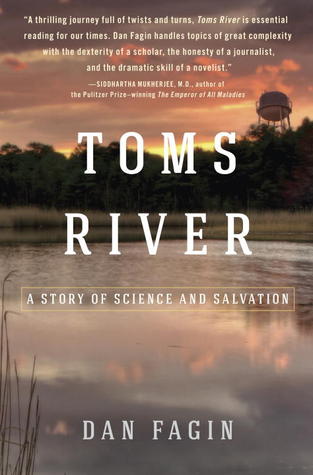Eileen's Reviews > Toms River: A Story of Science and Salvation
Toms River: A Story of Science and Salvation
by

by

I have lived in Toms River twice – first while in high school, from 1984-1989, and it is my current residence since 2000. When my family originally moved to New Jersey in 1984, we lived not too far from where the first break in the Ciba-Giegy pipeline occurred. The story Fagin tells is the background story of my high school and college years. Many of the players he mentioned are real people to me - Bill McVeigh was my history teacher in high school and the ex-navy seal who owned a dive shop in town whose advice was sought after by the Greenpeace disrupters was the father of one of my brother's closest high school buddies. While doing some student teaching in a Toms River elementary school located in the core zone, there was a young girl in that class 6th grade class with leukemia – we knew people in town who had young kids with cancer. The book doesn't say, but Bill McVeigh, the Toms River High School East history teacher who lived on Cardinal Drive (which backed up to Ciba-Giegy’s property) also died prematurely from cancer a few years ago, at far too young an age.
As a resident of this town, Fagin’s book rings resoundingly and disturbingly true to me and my memory of the events as they unfolded. Small town politics mixed with corporate greed and people who knew if they lost that job at Ciba that there wasn't much else in town with a comparable earning potential made for a perfect storm – just the right combination for good people to look the other way or stop asking hard questions. Ciba was the big bad wolf, but more disturbing to me, actually, was the Riech Farm site, which I don't recall getting the same press and which caused far more pollution and contamination for a considerably longer period of time, with absolutely no regulation. That Furnicola never paid a dime of the $40/day he told the Reich’s he’d pay them to allow him to store the waste drums on their property is par for the sad and disturbing course of the story. Definitely not the kind of thing one wants the hometown to be famous for.
That research is so cumbersome and so expensive to conduct on cluster cancers (and I suspect a potential link to an area Austism cluster as well), is beyond frustrating to me as a community member. The truth is out there, and it’s always complex. Always. Too expensive or too cumbersome is a b.s. excuse to keep turning a blind eye, and not looking at the NUMEROUS locations where similar events have occurred, because, it’s just too hard and too expensive to prove, and the corporations have way deeper pockets to obfuscate than the general public does.
I would recommend this to anyone who lives in Toms River, or in an area where you suspect disease due to industrial waste teratogens. Fagin’s research is excellent and his attention to detail was well appreciated by me. He discusses complex medical and statistical issues, but does so in a way that makes them understandable and relatable. The story of how the offending chemicals were discussed, how their production evolved, and why they were so in demand, along with the historical exploration of how we’ve come to our current understanding of how cancer occurs, were also very well done.
As a resident of this town, Fagin’s book rings resoundingly and disturbingly true to me and my memory of the events as they unfolded. Small town politics mixed with corporate greed and people who knew if they lost that job at Ciba that there wasn't much else in town with a comparable earning potential made for a perfect storm – just the right combination for good people to look the other way or stop asking hard questions. Ciba was the big bad wolf, but more disturbing to me, actually, was the Riech Farm site, which I don't recall getting the same press and which caused far more pollution and contamination for a considerably longer period of time, with absolutely no regulation. That Furnicola never paid a dime of the $40/day he told the Reich’s he’d pay them to allow him to store the waste drums on their property is par for the sad and disturbing course of the story. Definitely not the kind of thing one wants the hometown to be famous for.
That research is so cumbersome and so expensive to conduct on cluster cancers (and I suspect a potential link to an area Austism cluster as well), is beyond frustrating to me as a community member. The truth is out there, and it’s always complex. Always. Too expensive or too cumbersome is a b.s. excuse to keep turning a blind eye, and not looking at the NUMEROUS locations where similar events have occurred, because, it’s just too hard and too expensive to prove, and the corporations have way deeper pockets to obfuscate than the general public does.
I would recommend this to anyone who lives in Toms River, or in an area where you suspect disease due to industrial waste teratogens. Fagin’s research is excellent and his attention to detail was well appreciated by me. He discusses complex medical and statistical issues, but does so in a way that makes them understandable and relatable. The story of how the offending chemicals were discussed, how their production evolved, and why they were so in demand, along with the historical exploration of how we’ve come to our current understanding of how cancer occurs, were also very well done.
Sign into Goodreads to see if any of your friends have read
Toms River.
Sign In »
Quotes Eileen Liked

“A simple pecking order has always characterized mankind's relationship to waste: The wealthy throw out what they do not want, the poor scavenge what they can, and whatever remains is left to rot.”
― Toms River: A Story of Science and Salvation
― Toms River: A Story of Science and Salvation
Reading Progress
March 29, 2013
–
Started Reading
March 29, 2013
– Shelved as:
audiobooks
March 29, 2013
– Shelved
March 29, 2013
– Shelved as:
history
March 29, 2013
– Shelved as:
non-fiction
March 29, 2013
– Shelved as:
books-i-own
April 3, 2013
–
30.89%
""met with a local diver who was an ex-navy seal who had ties to Ciba-Giegy" - I know who that is! So weird to listen to a book about your home town - your awareness of the undercurrents is odd!"
page
173
April 9, 2013
–
Finished Reading
Comments Showing 1-8 of 8 (8 new)
date newest »
newest »
 newest »
newest »
message 1:
by
Evan
(new)
-
rated it 5 stars
Apr 21, 2013 05:26AM
 Fascinating. Thanks for sharing your recollection. If I may ask, do you remember the year when people first began talking about the incidence of cancer? Was the chatter as early as the first pipeline break?
Fascinating. Thanks for sharing your recollection. If I may ask, do you remember the year when people first began talking about the incidence of cancer? Was the chatter as early as the first pipeline break?
reply
|
flag
 I can't speak to pre-1984, but I remember the childhood cancer being talked about throughout my entire high school career, and into my college years. I always remember it as part of the background conversation. Since I moved to town shortly after the 1983 break, people were definitely talking about it - about the smell, etc., and about the kids with weird cancers. I graduated high school in 1987, and I know people were talking about it at that point.
I can't speak to pre-1984, but I remember the childhood cancer being talked about throughout my entire high school career, and into my college years. I always remember it as part of the background conversation. Since I moved to town shortly after the 1983 break, people were definitely talking about it - about the smell, etc., and about the kids with weird cancers. I graduated high school in 1987, and I know people were talking about it at that point.
 Thank you so much for sharing your personal experiences and insight. This is an unusually valuable review.
Thank you so much for sharing your personal experiences and insight. This is an unusually valuable review.
 Great review and supports my feelings about the accuracy of the book. I live in New Zealand and the book reached me although it probably won't be well read here.
Great review and supports my feelings about the accuracy of the book. I live in New Zealand and the book reached me although it probably won't be well read here.
 I am currently reading this book and really enjoyed your review, I chose the book after reading "Amity and Prosperity". In light of the rollbacks occurring in environmental protections, books like these are resonating with me.
I am currently reading this book and really enjoyed your review, I chose the book after reading "Amity and Prosperity". In light of the rollbacks occurring in environmental protections, books like these are resonating with me.




